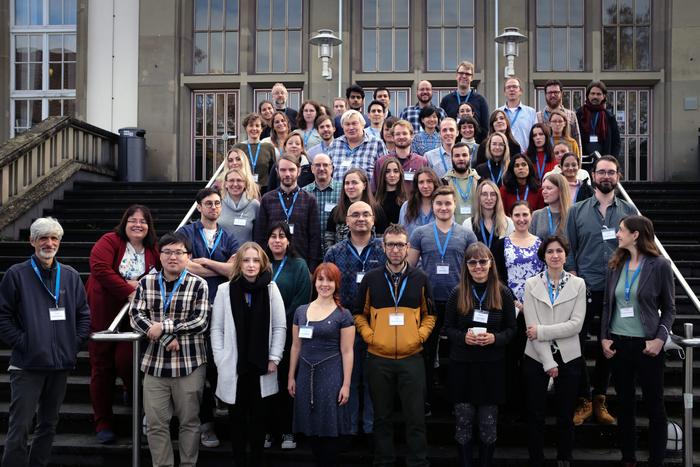Over the past four and a half years, Mainz University has made significant advances in unravelling the role of gene regulation in adaptation and evolution by combining evolutionary and molecular biology within its doctoral training program. As a result, the German Research Foundation (DFG) has agreed to extend funding for the Research Training Group 2526 “Gene Regulation in Evolution: From Molecular to Extended Phenotypes” (GenEvo) with approximately EUR 7 million over the next 4 years. “This is a fantastic success based on our achievements in recent years. And we want to continue this success story with our doctoral students in the second funding period”, said Professor Susanne Foitzik, spokesperson of GenEvo. GenEvo is based within JGU’s Department of Biology and is organized in cooperation with the Institute of Molecular Biology (IMB).

Credit: photo/©: Erwann Collin
Over the past four and a half years, Mainz University has made significant advances in unravelling the role of gene regulation in adaptation and evolution by combining evolutionary and molecular biology within its doctoral training program. As a result, the German Research Foundation (DFG) has agreed to extend funding for the Research Training Group 2526 “Gene Regulation in Evolution: From Molecular to Extended Phenotypes” (GenEvo) with approximately EUR 7 million over the next 4 years. “This is a fantastic success based on our achievements in recent years. And we want to continue this success story with our doctoral students in the second funding period”, said Professor Susanne Foitzik, spokesperson of GenEvo. GenEvo is based within JGU’s Department of Biology and is organized in cooperation with the Institute of Molecular Biology (IMB).
The second funding period will start in January 2024 and end in June 2028. A total of 13 additional doctoral students will be recruited to work on projects in the field of gene regulation in evolution. Initially, they will overlap with 14 doctoral students from the first funding period who are still completing their projects. This will facilitate scientific exchange between the two groups. “GenEvo is designed to allow experienced scientists to support and train younger people in their interdisciplinary research and encourage them in their personal development”, emphasized Professor Susanne Foitzik. This approach has been highly successful: to date, 25 research papers have been published by GenEvo researchers, some in highly renowned scientific journals such as Nature. Former GenEvo members have also received and accepted prestigious job offers in Germany and abroad.
Two key questions: What role does gene regulation play in evolutionary adaptation? And how do gene regulatory processes evolve?
GenEvo is a network of experts and young scientists jointly researching key questions such as what role gene regulation plays in evolutionary adaptations and how complex gene regulatory systems have developed. The link from an organism’s genotype or genetic makeup to its phenotype or appearance is complex. Phenotypic variation mainly results from differences in gene activity. Although various regulatory mechanisms are known, their influence and the extent to which they interact to produce phenotypic variation is largely unknown.
“It is particularly exciting to look at the role of gene regulation against the background of evolution and to investigate how gene regulatory mechanisms have changed over time and continue to develop”, said Professor René Ketting of IMB, who is the co-spokesperson. GenEvo will be supported in its future research by new members with new scientific ideas, including Humboldt Professor and theoretical evolutionary biologist Professor Hanna Kokko, who brings mathematical modelling techniques to the RTG. New questions are also being raised, such as to what extent epigenetic traits can be inherited and the role of gene expression for sex determination in different organisms. The role of gene regulation in the evolution of ageing processes is also a new focus.
GenEvo continues to have a high proportion of women and international members in the second phase
Although research – especially in the laboratory – was particularly difficult during the COVID-19 pandemic, the majority of GenEvo doctoral students have already completed their degrees or are about to do so. “The students have done a great job and deeply impressed the reviewers. We are all proud of their achievements”, said Professor Susanne Foitzik. For the second phase of GenEvo, the members are also extremely international, with over 50 percent of doctoral students and their supervisors coming from abroad. The proportion of women is just as high, with over half at all levels, from doctoral students to senior researchers.
DFG Research Training Groups for the promotion of early career researchers
Research Training Groups are programs that promote early career researchers and are funded by the German Research Foundation for a maximum of nine years. Doctoral students work within a thematically focused research program with a structured curriculum. The aim is to prepare them for a career in science and support them in their scientific independence.
About the Institute of Molecular Biology
The Institute of Molecular Biology (IMB) is a center of excellence in the life sciences that was established in 2011 on the campus of Johannes Gutenberg University Mainz (JGU). Research at IMB focuses on the cutting-edge fields of epigenetics, genome stability, ageing, and RNA biology. The institute is a prime example of successful collaboration between a private foundation and government: The Boehringer Ingelheim Foundation has committed EUR 154 million to be disbursed from 2009 until 2027 to cover the operating costs of research at IMB. The State of Rhineland-Palatinate has provided approximately EUR 50 million for the construction of a state-of-the-art building and is giving a further EUR 52 million in core funding from 2020 until 2027.




